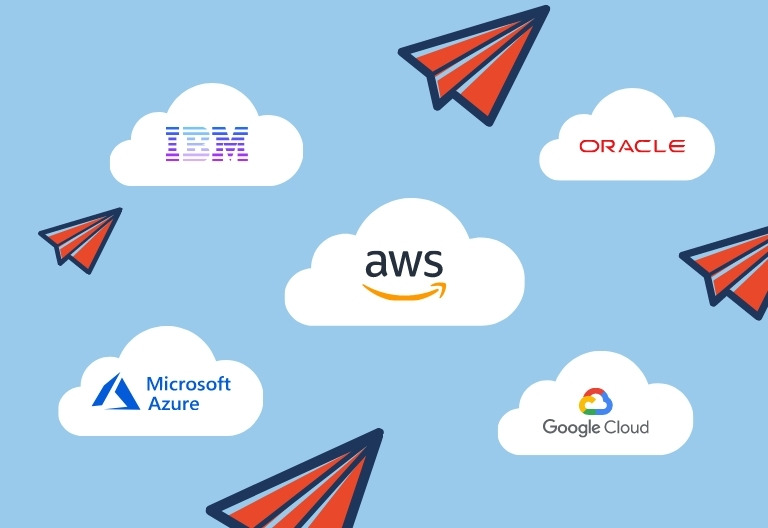In today’s current day and age, cloud computing services have provided the perfect platform and opportunity for enterprises to shift focus towards digital transformations. Those enterprises provide services like apps, software, processing, or cloud storage.
Cloud services have dramatically changed computing, not least through PaaS, Iaas, and, importantly, SaaS. It has allowed businesses to prepare their own virtual IT infrastructure and software delivery using the cloud. It is not dependent on a user’s OS.
Enterprises can push for maximum efficiency and cost-effectiveness by using a mixed bag of different cloud computing services providers. Additionally, this allows them to be away from vendor lock-in and improve redundancy. This could require extra cloud management software, but for larger businesses, the economic effects can be massive.
Cloud computing services run through software platforms and virtual networks. It is easy to access the data and analyse it for business intelligence and analytics purposes. It also makes it easier for all the various aspects of monitoring via cloud orchestration and easy log files processing through cloud logging services. The end result being an IT infrastructure that facilitates better patching and maintenance while providing for insights that would ordinarily in the past be extremely difficult to access.
One of the classic advantages of adopting cloud computing is scalability. It means you can access additional resources as an when you require it. Additionally, you are only charged for the duration of your usage. There is absolutely no need to buy any extra hardware for increased redundancy.
This is mostly applied to online storage of data, as online cloud storage can be deemed as limitless. Even though you could be using cloud databases for the structured data, you have the ability to effectively archive everything into humongous data lakes for additional processing using machine learning and AI for more significant insights.
All in all, cloud computing services provide unmatched potential to improvise the performance of the enterprise and increased profits.
Let us look at the leading cloud computing service providers, and some recommendations that may be considered:
Amazon Web Services
The most widely used cloud computing service
- Free trial option
- Massive list of services
- Highly customisable for specific needs

AWS started in 2006. It provides cloud computing based on the demand of organisations and individuals.
Amazon Web Services offers to build business solutions using integrated web services. It is a cloud-based program. They offer an extensive range of PaaS and IaaS services. Some of these services include Elastic Compute Cloud (EC2), Simple Storage Service (S3), Elastic Beanstalk, and Relational Database Service (RDS).
With secure Web Client, AWS offers extensive admin controls. In the web client, users can access various AWS features, including essential creation, encryption, and auditing.
AWS allows customisation of infrastructure requirements. This is significantly cheaper compared to setting up on your premises. Users have the option of using EC2 services. It will enable users to run and acquire servers on demand.
AWS primarily works on three pricing models. There is ‘Pay as you Go’, ‘Save when you reserve’ and ‘Pay less using more.’ For further information, you should go and check their website.
AWS offers a free ’12 month,’ but upon its expiration, you should move towards a paid model or cancel your subscription.
Microsoft Azure
One of the best cloud computing services provider
- Compatibility with Windows and Linux
- Comprehensive list of services
- 12 months of free service

MS Azure was introduced to the world almost a decade back, in 2010. It allows users to run various services on the cloud. It also lets you combine it with any infrastructure, data center or application.
MS Azure provides a broad spectrum of solutions for various levels of industries. All kinds of business requirements are taken into consideration, resulting in a better package for consumers.
Azure lowers down costs for the upkeep of onsite servers as there is no physical servers onsite. The presence of Azure Migration Center allows fast and more painless cloud transfers. This has compatibility with Linux too.
MS Azure has many free features within their offering. There is ’12 months’ worth of free services to help you get started. It comes with all popular services, $200 credit and 25 ‘Always Free’ services. All kinds of pricing and plan are included in detail within their official website. The website also consists of a cost calculator and ‘Pay as you go’ service. Every plan allows customisation to your specific requirements.
Google Cloud
Google’s mighty cloud computing service
- Wide range of services
- User interactive
- 1-year free trial

Google Cloud Platform is the cloud service provided by Google. In this platform, using Google-provided, modular web services, users can create business solutions. It provides a vast choice of PaaS and IaaS solutions.
Users can be rest assured that anything you code, create, store, or build using GCP will be protected. This is done through a multi-layer security infrastructure using Google Cloud. It was developed by a highly trained team of engineers with a joint commitment to transparency.
Google Cloud has various kinds of tools that ensure consistent management and performance. Some of these include Compute Engine, Container Engine, Big Query, App Engine, and Cloud Storage. Google also offers seamless migration to virtual machines with affordable and flexible pricing.
Google has claimed it to be a leader when pricing is compared to major rivals, and you have the option of ‘try before you buy.’
IBM Cloud
Reasonably priced cloud computing service from one of the biggest tech giants
- Fully customisable to suit your needs
- Management tools
- Pre-configured tools

IBM Cloud is a cloud computing service offered by the tech giant IBM. They offer infrastructure as a service, platform as a service, and software as a service.
IBM Cloud offers a vast range of services. They are just not limited to cloud-based: it encompasses both virtual and hardware-based servers. They consist of management, public and private networks.
You have complete control of the infrastructure, as IBM Cloud combines hardware and virtual-based-servers. IBM calls its hardware servers ‘bare metal.’ These provide users and clients with exclusive access to their entire server. This greatly enhances performance.
IBM Cloud offers management and integration by a single system controlled using API (Application Programming Interface), web portal, or mobile apps.
IBM Cloud offers complete customisation. It means you handpick anything included in the server. This prevents you from paying for services that you do not use.
Oracle Cloud Infrastructure
Another cloud computing service from a tech giant
- Free tier
- Enterprise ready
- Storage and architecture

Oracle Cloud Infrastructure (OCI) is a cloud service provided by Oracle. It is a powerful and feature-packed platform. A recent Forrest review suggested that Oracle’s services were incredibly strong at supporting various kinds of workloads. This was primarily for the Internet of things (IoT), OLTP, microservices, along with applications dependent on Artificial Intelligence (AI) and Machine Learning (ML). There are basically two main service provisions available: storage data and cloud architecture.
Cloud architecture has databases, data management, and applications. Oracle Data Cloud is mostly for driving big data analytics for business intelligence insights. Oracle also provided a host of other SaaS platforms such as SCM, EPM, HCM, and tools for social media.
With OCI, there is a vast range of potential within its services. However, their services are better suited and designed to accommodate the needs of the enterprise rather than individual or small business needs.
For anyone who signs up, apart from 30 days free trial, OCI also offers a tier of free service that includes unlimited access to two autonomous databases. They come with Oracle Application Express (OPEX) and Oracle SQL developer, two compute VMs, object, block, and archive storage, as well as monitoring, notifications, and load balancing.
We at Mettlesoft Technologies are proficient in the above cloud services. To know more about how we can digitally transform your organisation, reach out to us.




